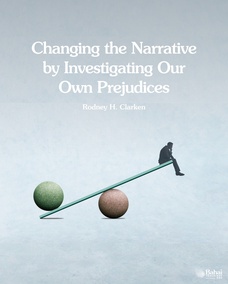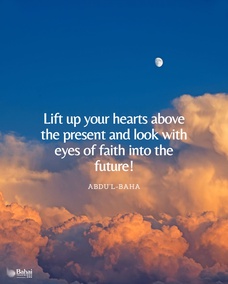The views expressed in our content reflect individual perspectives and do not represent the authoritative views of the Baha'i Faith.
Years of involvement with educational systems, and even starting a school overseas years ago, have led me to this question: Does our education system serve all aspects of our children’s lives?
I always thought that education was about discovering the hidden talents and potential of children and youth, teaching them to think for themselves, and giving them sufficient knowledge and wisdom to choose the right path – but it seems we’ve strayed far from those essential goals.
From my perspective, the main goal of education involves awakening students to their potential so they can take charge of their lives. Throughout my career, this quotation from the Baha’i writings has been my guiding light to navigate the tricky and complicated education system: “Regard man as a mine rich in gems of inestimable value.Education can, alone, cause it to reveal its treasures, and enable mankind to benefit therefrom.”
RELATED: Child-Rearing Tip #1: Don’t Make Life Too Easy for Your Kids
In the past, and even now in some places in the world, children were sent to a master or guru for their education. They were taught the basic facts of being human by emphasizing moral and spiritual values, and once that was achieved, then the master would proceed to teach them mathematics and sciences – because human and spiritual values were considered the requisite foundation for building a good life.
Sadly, these days, we can create beautiful designs and teach important skills, but we do so without consideration for the foundation and its maintenance. Our educational systems have become one-sided, with great stress put on material success. The whole system is geared to impart the necessary skills for success in the material world and the marketplace, and little or no effort is put in place to enrich and encourage achieving the higher goal of becoming a better human being and creating a balance between material and spiritual goals.
In my mind, education must develop human potential first, as this passage from the Baha’i teachings points out:
Every child is potentially the light of the world — and at the same time its darkness; wherefore must the question of education be accounted as of primary importance. From his infancy, the child must be nursed at the breast of God’s love, and nurtured in the embrace of His knowledge, that he may radiate light, grow in spirituality, be filled with wisdom and learning, and take on the characteristics of the angelic host.
Sadly, however, our goals have moved away from developing human and spiritual potential to producing individuals skilled in navigating the competitive world of the job market and landing jobs with high salaries and benefits.
When we put the educational emphasis on the material side of life, we do allow a small minority of our students to climb the ladder of financial gain. But even the education system’s success in teaching the essential facts of management of the material side is questionable – one of my ex-students told me that she was robbed of 12 years of her life spent in school because she did not learn the basics of how to manage her finances. When we focus on material success for a few, we ignore the concept of planning for a prosperous and balanced economic and moral life for everyone.
I understand the need for and importance of material success, but the question is, at what cost? In most cases, the price we pay neglects the importance of developing the potential of our souls.
There is nothing wrong with being financially successful: having a profession, degrees, skills, and wealth, as long as we remember that our degrees, work, and wealth do not define who we are. In reality, in our materialistic world, who you are has become secondary to what you have, those superficial indicators or yardsticks for measuring life’s success.
RELATED: Losing the Macho Mask: Raising Boys as Peacemakers
Abdu’l-Baha said:
It is indeed a good and praiseworthy thing to progress materially, but in so doing, let us not neglect the more important spiritual progress, and close our eyes to the Divine light shining in our midst.
Only by improving spiritually as well as materially can we make any real progress, and become perfect beings.
What’s the solution? We need to teach children and youth the importance of balanced lives, so individuals can experience the fruits of both sides of their existence.
Various religions in the world have offered religious schools to address this fundamental problem. But still, sadly, some of them emphasize the supposed supremacy of that religion over others, presenting their religion as the only way to God or salvation. That leads to fanaticism, alienation, and division, destroying the potential of their students.
The Baha’i teachings assert that every child is full of gifts from the Creator, and education’s role is to develop them and make them shine. It is tragic to me that when we think of the sad situation in the world, we see the loss of lives due to wars, natural disasters, and diseases. But we never think of so many souls being lost every day and never discovering their potential because of a lack of a proper education. Real education guides students to learn the meaning of a prosperous and balanced life of progressing materially and also progressing in the acquisition of human and spiritual values in their journey of life.
Every child is full of gifts from the Creator, and education’s role involves developing those gifts and allowing them to shine, discovering the real meaning of a prosperous and balanced life — of progressing materially and also progressing in the acquisition of human and spiritual values.
The most significant point lost in discussions where material success is glorified and praised is that many wealthy people who gain vast wealth realize at the end of their lives that they must leave all possessions behind when they die. On the other hand, the spiritual and moral growth made during a lifetime does not disappear and creates great satisfaction that life spent on acquiring human virtues was not a waste.












![[God] hath made woman and man to abide with each other in the closest companionship, and to be even as a single soul. They are two helpmates, two intimate friends, who should be concerned about the welfare of each other. If they live thus, they will pass through this world with perfect contentment, bliss, and peace of heart, and become the object of divine grace and favour in the Kingdom of heaven. But if they do other than this, they will live out their lives in great bitterness, longing at every moment for death, and will be shamefaced in the heavenly realm. Strive, then, to abide, heart and soul, with each other as two doves in the nest, for this is to be blessed in both worlds. – #AbdulBaha #Love #Marriage #Companionship #BahaiFaith
(Selections from the Writings of ‘Abdu’l-Bahá, paragraphs 92.1–92.3)](https://media.bahaiteachings.org/sb-instagram-feed-images/487782836_18497319871023335_4819806972653811469_n__v284x284__.jpeg)



Comments
Sign in or create an account
Continue with Googleor